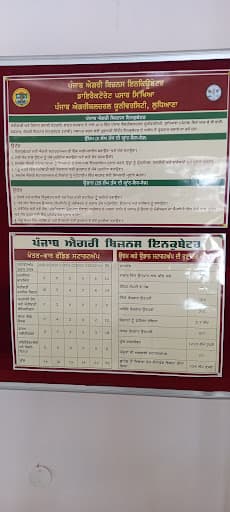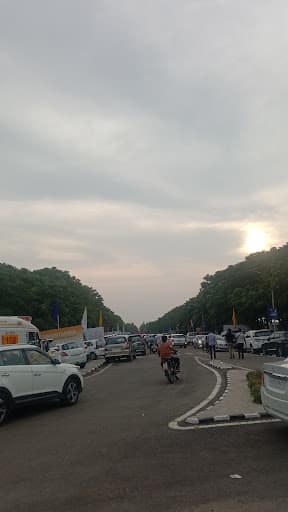More About Punjab Agricultural University
Campus Area
1220
Total Seat
1606
Faculty Student Ratio
approximately 6.5:1
Punjab Agricultural University Rankings, Accreditations & Recognitions

All India Council for Technical Education (AICTE)

ICAR (ICAR)

National Assessment and Accreditation Council (NAAC)

NAEAB (NAEAB)

University Grants Commission (UGC)
Agricultural & Horticultural Institutions Nationwide 2025
State Agricultural Universities 2025
Agriculture & Allied Sectors 2024
Overall 2024
University 2024
University (Overall) 2023
About Punjab Agricultural University - [PAU] Ludhiana
Punjab Agricultural University (PAU), established in 1962, is a premier state government agricultural university located in Ludhiana, Punjab. It operates as a state university under the aegis of the Government of Punjab and is affiliated with the University Grants Commission (UGC).
PAU holds an A+ grade from the National Agricultural Education Accreditation Board and has consistently ranked first among agricultural universities in India in the National Institutional Ranking Framework (NIRF) for 2023, 2024, and 2025. It offers over 90 academic programs across undergraduate, postgraduate, and doctoral levels, with a student strength exceeding 4,000 and a highly qualified faculty. The university is renowned for its research excellence, global recognition, and significant contributions to agricultural education and innovation.
Key Highlights
| Parameter | Details |
|---|---|
| Full Name | Punjab Agricultural University |
| Established | 1962 |
| Type | State Government University |
| Affiliation | University Grants Commission (UGC) |
| NAAC Grade | A+ (Valid till 2026) |
| NIRF 2025 | #1 among Agricultural Universities in India; #3 in Agriculture and Allied Sectors |
| Campus | 1500+ acres, Ludhiana, Punjab |
| Courses | 90+ UG, PG, and PhD programs |
| Students | 4000+ |
| Faculty | 259+ (College of Agriculture alone) |
| Popular Programmes | Agriculture, Horticulture, Agricultural Engineering, Forestry, Community Science |
| Website | https://pau.edu |
Courses Offered at PAU Ludhiana
Specializations
Specializations
Specializations
Specializations
Specializations
Specializations
Specializations
Specializations
Specializations
Specializations
Admission Dates 2026
Punjab Agricultural University (PAU) Ludhiana admission for 2026 is primarily entrance exam based, including PAU CET for undergraduate courses like B.Sc Agriculture and B.Tech, and PAU MET or national exams like CAT, CUET PG, ICAR AIEEA for postgraduate courses such as MBA. The university conducts counselling after entrance exams for seat allocation.
| Programme | Event | Date |
|---|---|---|
| BSc, BTech (PAU CET) | Application Start | 11 May 2026 |
| BSc, BTech (PAU CET) | Application Deadline | 08 April 2026 |
| BSc, BTech (PAU CET) | Entrance Exam Date | 01 June 2026 |
| BSc, BTech (PAU CET) | Counselling Start | June 2026 |
| MBA | Application Start | 05 May 2026 |
| MBA | Application Deadline | 08 June 2026 |
| MBA | Admit Card Release | 28 June 2026 |
| MBA | Counselling | 31 August - 30 September 2026 |
| PhD | Application Deadline without late fee | 17 October 2026 |
| PhD | Application Deadline with late fee | 24 October 2026 |
Campus Gallery Of Punjab Agricultural University








Admission Process
Punjab Agricultural University (PAU) Ludhiana offers admissions primarily through entrance exams such as PAU CET, ICAR AIEEA, and PAU MET for various undergraduate and postgraduate programs. Candidates must apply online, clear the relevant entrance test, and participate in counselling for seat allocation.
B.Tech Admission
Steps to Apply
- Visit the official PAU website and download the application form for B.Tech Agricultural Engineering.
- Register and fill out the online application form, then pay the application fee.
- Appear for the PAU Common Entrance Test (CET) or submit valid JEE Main scores.
- Check the merit list based on entrance exam rank and academic performance.
- Participate in the counselling process for seat allotment.
- Submit required documents and pay the admission fees to confirm admission.
MBA Admission
Steps to Apply
- Apply online on the PAU official website for the MBA program.
- Appear for the PAU MET entrance exam or submit valid ICAR AIEEA/CUET PG scores.
- Shortlisted candidates will be called for a personal interview (PI) round.
- Participate in the counselling session conducted by PAU.
- Complete document verification and pay the admission fees to secure the seat.
Eligibility Criteria & Fees
| Programme | Qualification | Entrance Exam | Min % |
|---|---|---|---|
| B.Tech Agricultural Engineering | 10+2 with Physics, Chemistry, Mathematics | PAU CET / JEE Main | 50% |
| MBA (General / Agri-Business) | Graduation in any discipline | PAU MET / ICAR AIEEA / CUET PG | 60% |
| B.Sc (Hons) Agriculture | 10+2 with PCM/PCB/Agriculture | PAU CET / AAT | 50% |
| M.Sc Agriculture | B.Sc Agriculture | PAU MET / ICAR AIEEA | 60% |
Documents Required
- Class 10th and 12th mark sheets and certificates
- Graduation mark sheet and degree certificate (for PG courses)
- Entrance exam scorecard
- Residence/Domicile certificate
- Category certificate (if applicable)
- Passport size photographs
- Valid photo ID proof (Aadhar card, PAN card, etc.)
- Income certificate (if applicable)
- Character certificate
Punjab Agricultural University College Details

Punjab Agricultural University, Ludhiana-141004, Punjab, India

Contact: 0161-2401960-79 Ext:- 213
Nearby Locations

Sahnewal Airport (Ludhiana Airport)
18 km

Ludhiana Bus Stand
4 km

Deepak Hospital
1.1 km

Ludhiana Junction Railway Station
5 km
Cutoff 2025
The 2025 cutoff trends at Punjab Agricultural University (PAU) Ludhiana show competitive ranks for JEE Main and ICAR AIEEA UG exams, with general category closing ranks for B.Tech Agricultural Engineering around 700 in JEE Main Home State quota. ICAR UG cutoffs for general category range between 370 and 390 rank, reflecting steady demand in agricultural courses. Category-wise cutoffs vary significantly, with OBC and EWS cutoffs higher than SC/ST where specified.
| Exam | Branch/Course | General | OBC | SC | ST | EWS |
|---|---|---|---|---|---|---|
| JEE Main | B.Tech Agricultural Engineering (Home State) | 700 | – | – | – | – |
| ICAR AIEEA UG | B.Sc Agriculture and Allied Fields | 370-390 | 750 | – | – | 550-650 |
| PAU CET | B.Sc (Hons) Agriculture | 2909 | – | – | – | – |
| CUET PG | MBA Agribusiness | 230 (approx. 80 percentile, 1st round) | – | 140-200 (category rounds) | – | – |
Campus Facilities at Punjab Agricultural University
Auditoriums
Classrooms
Conference Halls
Lecture Rooms
Museum Art Gallery
Research Hall
Guest House
Convenience Store
Water Facilities
Access Control System
Visitor Parking Policy (Proposed)
Cafeteria and Canteens
Mess Halls
Boys Hostels
Girls Hostels
Hostel Accommodation for International Students
College Computer Center
E-Governance Development Centre
University Data Centre
University Information Superhighway Centre
Virus Free Internet Café
Wi-Fi Campus
NIDHI-TBI (National Initiative for Developing and Harnessing Innovations - Technology Business Incubator)
Punjab Agri Business Incubator (PABI)
Skill Development Centre
Agro-Processing Centre (Planned)
Biotechnology Lab
Central Instrument Lab
Computer Labs
Electrical Machines Lab
Electron Microscopy and Nano-science Laboratory
Central Library
Departmental Book Banks
Digital Library
PAU Health Centre / Hospital
Gardens and Green Campus
Indoor Games Rooms (Hostels)
TV Rooms (Hostels)
Campus Security System
Sports Complex
Counselling Cell
Parking Facilities
Placements 2025
Punjab Agricultural University (PAU) Ludhiana recorded a strong placement performance in 2025, with a total of 244 students placed across undergraduate and postgraduate programs. The highest package reached , while the average package stood at . The median salary for UG and PG students was , reflecting steady growth in placement outcomes.
Placement Statistics
| Parameter | Value |
|---|---|
| Placement Rate | Approximately 56% |
| Students Placed | 244/433 (UG + PG combined) |
Top Recruiters
IT: Infosys, Wipro, TCS
Consulting: EY
Core: John Deere, Mahindra and Mahindra, TAFE, Bayer, Syngenta, VERKA, HDFC Bank, Axis Bank, UPL
Branch-wise Placement
| Branch | %Placed |
|---|---|
| UG 4-year courses | ~28% |
| UG 6-year courses | ~22% |
| PG 2-year courses | ~50% |
Student Reviews & Testimonials
Gurinder Singh
Today I visit punjab agriculture University ludhiana.... Well experience was very nice.....because of nest n clean environment and supportive professors....feel very good.... Specially, in skills development centre.... here's one pictures n videos
ABDUL RAHMAN
I went to this University during the exhibition days. The University is very big and beautiful. The staff and people there are very nice. Punjabis are amazing.
Hitendra Singh Negi
One of the best agriculture University in India. To research and development of New variety of seeds, plants and technologies to make farmers life better is the goal on this University. People can buy good quality of seeds, saplings and plants here.
Jon
I visited this institution with friends; one had been a student here. Very good facilities, he had a positive experience and the grounds are extensive. I really enjoyed the visit with my friends.
Rankings & Accreditations
Punjab Agricultural University (PAU), Ludhiana, is ranked 3rd nationally in the Agriculture and Allied Sectors category by NIRF 2025 and holds the top position among state agricultural universities in India for the third consecutive year. Globally, PAU is recognized in the EduRank 2025 list, securing 93rd place among the world's top 100 agricultural institutions. It also ranks 64th among Indian universities overall in NIRF 2025.
NIRF 2025
| Category | Rank | Score |
|---|---|---|
| Agriculture and Allied Sectors | #3 | 75.83/100 |
| Overall University (India) | #64 | 50.84/100 |
| State Public Universities | #1 | – |
Other Rankings
| Agency | Rank | Year |
|---|---|---|
| EduRank (Global Agricultural Sciences) | #93 | 2025 |
| Indian Institutional Ranking Framework (IIRF) | #1 (State Agricultural Universities) | 2025 |
Accreditations
- NAAC: A+ Grade (Valid till 2026)
Scholarships & Financial Aid
Punjab Agricultural University (PAU) Ludhiana offers a range of scholarships to support meritorious and economically disadvantaged students, including merit-based awards, need-based scholarships, and category-specific financial aid. These include university scholarships, state government scholarships, and external foundation awards, with amounts varying from to per month and some full fee waivers for SC students.
Institute Scholarships
| Scholarship | Eligibility | Amount |
|---|---|---|
| PAU Merit Scholarships | Top 7 students based on merit list for COAE&T UG courses | /month |
| Professor R. N. Kaul Scholarship | UG girl students with minimum OCPA 7.00/10.00 | /month |
| Dr. Gurdev Singh Khush Scholarship | UG students with minimum OCPA 7.00/10.00 | /month |
| Dr. GS Khush Foundation Merit Scholarships | Meritorious undergraduate students from rural areas | Varies; merit scholarships and travel grants awarded annually |
| Postgraduate Fellowships | Top 7 M.Sc./MBA/M.Tech students per discipline | /month |
| ICAR PG Scholarship | ICAR nominees for postgraduate programs | /month + /year contingency |
| Special Merit Fellowships (e.g., Entomology, Chemistry, Zoology) | Merit-based for specific disciplines | to /month |
Government Scholarships
| Scheme | For | Amount | Portal |
|---|---|---|---|
| Punjab State Agriculture Marketing Board Merit-cum-Means Scholarship | Meritorious UG students from rural Punjab districts or Kandi area | /month | State Portal |
| Post Matric Scholarship for SC Students (Punjab Govt.) | SC category students with income criteria | Full fee waiver and maintenance as per policy | State Portal |
| National Talent Scholarship (ICAR) | ICAR nominees for UG programs | /month | NSP |
| National Fellowship and Scholarship for Higher Education of ST Students | ST students with family income < | to /year depending on course | NSP |
External Scholarships
- Dr. GS Khush Foundation: Merit scholarships and travel grants for rural undergraduate students, awarded annually
- Piara Singh Parmar Memorial Society: cash prize for M.Sc. meritorious student in Plant Pathology
- Vinay and Kumud Kaushal Scholarship: fellowship for outstanding MBA students at PAU
Comparison
Punjab Agricultural University (PAU) Ludhiana is compared with Indian Agricultural Research Institute (IARI) New Delhi and ICAR - National Dairy Research Institute (NDRI) Karnal as they are the top three agricultural universities in India according to NIRF 2025, excelling in agricultural education, research, and allied sectors.
| Parameter | Punjab Agricultural University - [PAU] Ludhiana | Indian Agricultural Research Institute (IARI) New Delhi | ICAR - National Dairy Research Institute (NDRI) Karnal |
|---|---|---|---|
| Type | Government | Government | Government |
| Established | 1962 | 1905 | 1923 |
| NIRF 2025 (Agriculture & Allied) | #3 | #1 | #2 |
| NAAC Grade | A+ | A+ | A+ |
Key Strengths
- Punjab Agricultural University - [PAU] Ludhiana: Leading state agricultural university with strong research output, ranked among the world's top 100 agricultural institutions, and a pioneer in agricultural education and innovation in Punjab.
- Indian Agricultural Research Institute (IARI) New Delhi: Premier national institute known for pioneering the Green Revolution, top-ranked in India for agricultural research, education, and technology development.
- ICAR - National Dairy Research Institute (NDRI) Karnal: Specialized in dairy science and animal husbandry research, with strong contributions to animal genetics, disease diagnostics, and vaccine development.
Campus & Infrastructure
Punjab Agricultural University (PAU) is located on Ferozepur Road in Ludhiana, Punjab, sprawling over a large area dedicated to agricultural education, research, and extension. The campus is well-established with multiple constituent colleges and facilities supporting its role as a pioneer in agricultural advancements in India.
Campus Details
| Parameter | Details |
|---|---|
| Area | 1500 acres |
| Location | Ludhiana, Punjab |
| Nearest Railway | Ludhiana Junction (5 km) |
| Nearest Airport | Sahnewal Airport, Ludhiana (15 km) |
Academic Facilities
- Library: Over 1,00,000 books, 500+ e-journals
- Labs: 50+ state-of-the-art laboratories
- Classrooms: 40 smart classrooms equipped with modern teaching aids
Hostel
| Type | Capacity |
|---|---|
| Boys | 1200 |
| Girls | 800 |
Other Facilities
- Sports Complex with facilities for cricket, hockey, basketball, and athletics
- Auditorium with seating capacity of 800
- Gymnasium with modern fitness equipment
- Farm machinery and equipment exhibition center
- Research farms and experimental fields spanning several hundred acres
Frequently Asked Questions
- Punjab Agricultural University is good for engineering with a placement rate of 92% and an average package of Rs 4.5 LPA, specializing in placements in companies like Amul, Nestle, and PepsiCo. The university provides training on modern machinery and technology, enhancing students' practical skills. PAU Ludhiana ranks #3 in the NIRF 2025 rankings under the category 'Agriculture and Allied Sectors'.
- Punjab Agricultural University is known for its leadership in farm mechanisation and conservation agriculture, and ranked #3 in the NIRF 2025 rankings under the category 'Agriculture and Allied Sectors'. The university offers 43 PG, 29 PhD, and 11 UG programmes across various streams, including management and engineering, through its 32 departments and 3 schools in six constituent colleges.
- Punjab Agricultural University is ranked #3 in NIRF 2025 for the category 'Agriculture and Allied Sectors'. PAU Ludhiana is not ranked in the QS World University Rankings for 2025. The university offers 43 PG, 29 PhD, and 11 UG programmes across various streams including Management and Engineering.
- Students at Punjab Agricultural University rate it 4.5/5 for faculty, highlighting the university's strong research capabilities and experienced faculty members, while also noting the high quality of teaching and the availability of experienced professionals. Pros include the university's ISO certification, its leadership in farm mechanization and conservation agriculture, and its strong placement record with many students securing jobs in top agricultural companies. Cons include the limited availability of seats in some courses, with applications being closed for certain programs, and the need for students to visit the official website for more information.
- The admission process at Punjab Agricultural University requires JEE Main scores followed by counseling for seat allotment. For the MBA program, candidates need to participate in an interview after clearing the entrance exam. The fees for BE/BTech courses range from Rs 1,50,000 to Rs 2,00,000 per year, depending on the specialisation.
- The campus life at Punjab Agricultural University offers 1220-acre facilities with 24 well-equipped hostels and a state-of-the-art mess serving over 5000 students, and includes a variety of clubs and fests such as the annual AgriTech Fest and sports events like the Inter-University Sports Meet. The environment is conducive to learning and research, with a student-to-faculty ratio of 15:1 and a vibrant academic community.
- The eligibility for Punjab Agricultural University requires a minimum of 55% in the qualifying examination and a qualifying score in JEE Main for BE/BTech admission in 2025. For the MBA programme, candidates need to have a minimum of 50% in their undergraduate degree and a good score in the CAT or MAT examination. Interested students should check the specific eligibility criteria for each course on the university's official website.
- The entrance exams accepted at Punjab Agricultural University are CUET and ICAR AIEEA with cutoffs typically ranging from 250 to 300 ranks.
- The important admission dates for Punjab Agricultural University are: application starts on January 1, 2025, exam is conducted on March 15, 2025, and results are announced on April 10, 2025.
- The placement at Punjab Agricultural University shows 85% students placed with an average package of Rs 4.8 LPA and a highest package of Rs 10 LPA. Top recruiters include Amul, Nestle, and Beri Udyog Pvt Ltd.
- The placement at Punjab Agricultural University shows 85% students placed with an average package of Rs 4.8 LPA and a highest package of Rs 7.5 LPA.



.png&w=1920&q=75)








